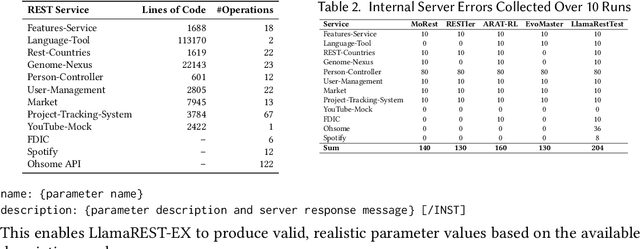Myeongsoo Kim
LlamaRestTest: Effective REST API Testing with Small Language Models
Jan 15, 2025



Abstract:Modern web services rely heavily on REST APIs, typically documented using the OpenAPI specification. The widespread adoption of this standard has resulted in the development of many black-box testing tools that generate tests based on these specifications. Recent advancements in Natural Language Processing (NLP), particularly with Large Language Models (LLMs), have enhanced REST API testing by extracting actionable rules and generating input values from the human-readable portions of the specification. However, these advancements overlook the potential of continuously refining the identified rules and test inputs based on server responses. To address this limitation, we present LlamaRestTest, a novel approach that employs two custom LLMs to generate realistic test inputs and uncover parameter dependencies during the testing process by incorporating server responses. These LLMs are created by fine-tuning the Llama3-8b model, using mined datasets of REST API example values and inter-parameter dependencies. We evaluated LlamaRestTest on 12 real-world services (including popular services such as Spotify), comparing it against RESTGPT, a GPT-powered specification-enhancement tool, as well as several state-of-the-art REST API testing tools, including RESTler, MoRest, EvoMaster, and ARAT-RL. Our results show that fine-tuning enables smaller LLMs to outperform larger models in detecting actionable rules and generating inputs for REST API testing. We evaluated configurations from the base Llama3-8B to fine-tuned versions and explored 2-bit, 4-bit, and 8-bit quantization for efficiency. LlamaRestTest surpasses state-of-the-art tools in code coverage and error detection, even with RESTGPT-enhanced specifications, and an ablation study highlights the impact of its novel components.
AutoRestTest: A Tool for Automated REST API Testing Using LLMs and MARL
Jan 15, 2025Abstract:As REST APIs have become widespread in modern web services, comprehensive testing of these APIs has become increasingly crucial. Due to the vast search space consisting of operations, parameters, and parameter values along with their complex dependencies and constraints, current testing tools suffer from low code coverage, leading to suboptimal fault detection. To address this limitation, we present a novel tool, AutoRestTest, which integrates the Semantic Operation Dependency Graph (SODG) with Multi-Agent Reinforcement Learning (MARL) and large language models (LLMs) for effective REST API testing. AutoRestTest determines operation-dependent parameters using the SODG and employs five specialized agents (operation, parameter, value, dependency, and header) to identify dependencies of operations and generate operation sequences, parameter combinations, and values. AutoRestTest provides a command-line interface and continuous telemetry on successful operation count, unique server errors detected, and time elapsed. Upon completion, AutoRestTest generates a detailed report highlighting errors detected and operations exercised. In this paper, we introduce our tool and present preliminary results.
A Multi-Agent Approach for REST API Testing with Semantic Graphs and LLM-Driven Inputs
Nov 11, 2024Abstract:As modern web services increasingly rely on REST APIs, their thorough testing has become crucial. Furthermore, the advent of REST API specifications such as the OpenAPI Specification has led to the emergence of many black-box REST API testing tools. However, these tools often focus on individual test elements in isolation (e.g., APIs, parameters, values), resulting in lower coverage and less effectiveness in detecting faults (i.e., 500 response codes). To address these limitations, we present AutoRestTest, the first black-box framework to adopt a dependency-embedded multi-agent approach for REST API testing, integrating Multi-Agent Reinforcement Learning (MARL) with a Semantic Property Dependency Graph (SPDG) and Large Language Models (LLMs). Our approach treats REST API testing as a separable problem, where four agents -- API, dependency, parameter, and value -- collaborate to optimize API exploration. LLMs handle domain-specific value restrictions, the SPDG model simplifies the search space for dependencies using a similarity score between API operations, and MARL dynamically optimizes the agents' behavior. Evaluated on 12 real-world REST services, AutoRestTest outperforms the four leading black-box REST API testing tools, including those assisted by RESTGPT (which augments realistic test inputs using LLMs), in terms of code coverage, operation coverage, and fault detection. Notably, AutoRestTest is the only tool able to identify an internal server error in Spotify. Our ablation study underscores the significant contributions of the agent learning, SPDG, and LLM components.
 Add to Chrome
Add to Chrome Add to Firefox
Add to Firefox Add to Edge
Add to Edge